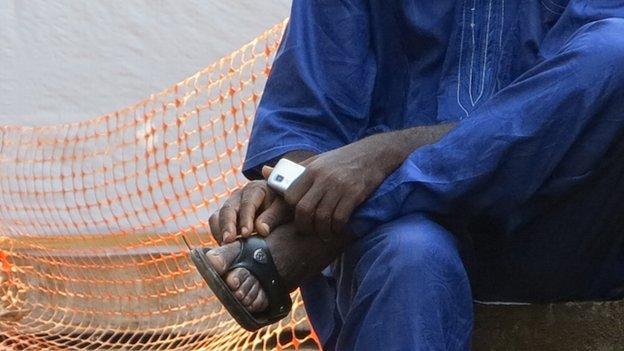Ebola: NHS can deal with threat to UK, says Philip Hammond
- Published
Philip Hammond: "There is no immediate threat"
The UK's health services have the experience to deal with the threat posed by the Ebola virus, Foreign Secretary Philip Hammond has said.
Mr Hammond said ministers had discussed what precautionary measures could be taken if any UK nationals in West Africa became infected.
He said the threat to Britain came from someone contracting the disease abroad and becoming unwell back in the UK.
The Ebola virus has killed more than 670 people in West Africa.
Several West African airlines have now stopped flying to Liberia and Sierra Leone amid concerns about the spread of the disease to those countries from Guinea.
The move by airlines comes after an infected American man of Liberian descent was found to have flown from Liberia to Nigeria last week. He developed symptoms during the flight.
All schools in Liberia have been shut down to try to stop the spread of the disease and some communities have been placed into quarantine.

Analysis
By Helen Briggs, Health Editor, BBC News website
Doctors have been told to remain vigilant for possible cases of Ebola "imported" to the UK.
The medical director of Public Health England said it was "unlikely but not impossible" that travellers infected in West Africa could develop symptoms on their return. According to Dr Ben Neuman, a virologist at Reading University, the chance of the virus spreading in the UK was "very, very small".
He said anyone showing signs of fever from an outbreak area would be quarantined and treated in containment facilities if the infection were confirmed.
He said the virus itself is "delicate and inefficient - you have to pick it up from bodily fluids". But he said it was sensible to be prepared, given the situation in West Africa.

Earlier this month Public Health England issued an alert to UK doctors to be aware of Ebola symptoms.
After chairing an emergency Cobra meeting about the issue, Mr Hammond said ministers had discussed what additional measures the UK could take to help control the outbreak.
'Absolutely focused'
But the foreign secretary said the disease had not yet "directly" affected the UK.
"In terms of the UK, the issue is about the possibility of somebody who has contracted the disease in West Africa getting sick here," he said.
"It is not about the disease spreading in the UK because we have frankly different standards of infection control procedures that would make that most unlikely," he said.
"We do not at the moment think that this is an issue which affects the UK directly," he added.
Health Secretary Jeremy Hunt, who was also at the meeting, said the experience of NHS staff meant "the risk of this disease spreading fast in the UK is much lower, because of that expertise".
Dr Paul Cosford from Public Health England says the level of risk to people in the UK is low
Mr Hammond earlier told the BBC the government was "absolutely focused" on tackling the threat.
"At the moment we don't think any British nationals [abroad] are affected and we are fairly confident there are no cases in the UK," he said.
A Public Health England spokeswoman said the alert sent to UK doctors on 1 July had advised them to be aware of the symptoms of Ebola, especially in people who had recently returned from the region.
Issuing national medical alerts was a very common event, the spokeswoman added.
Neither the World Health Organization or the UK Foreign Office are recommending any travel restrictions to Guinea, Liberia or Sierra Leone.
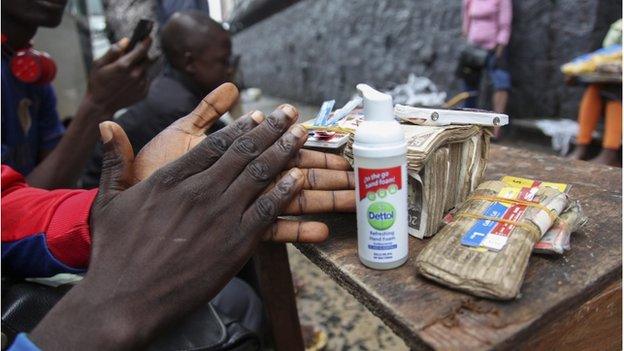
People in affected areas have been advised to regularly clean their hands to combat the spread of Ebola
The Department of Health said a man had been tested for Ebola in Birmingham but tests for the virus had proved negative.
The BBC's Norman Smith said the Department for International Development was setting aside about £2m to provide medical staff and public information in West Africa in an attempt to contain the disease there.
Earlier, the government's chief scientific adviser Sir Mark Walport told the Daily Telegraph, external that emerging infectious diseases were a "global grand challenge".
"We were lucky with Sars. But we have to do the best horizon scanning," he said.

At the scene
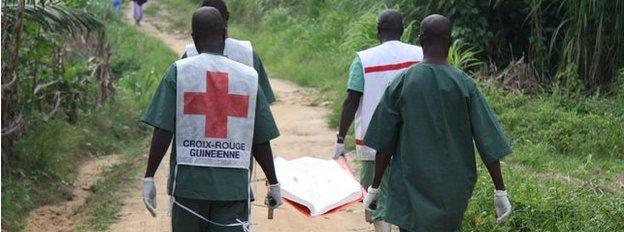
Tulip Mazumdar, Gueckadou, Guinea
This is the final resting place of the latest victim of Ebola - a four-month-old baby boy called Faya.
He caught the virus from his mother, who died a few weeks earlier. His is the 20th anonymous grave in this dark and lonely clearing.
"I was there with him just before he died," says Adele Millimouno, a Medicins Sans Frontieres (MSF) nurse recruited from a nearby village.
"I had been feeding him milk. I stepped away, just for a short break, but then I was called back and he was dead. I was totally devastated."

Early treatment
Dr Brian McCloskey, director of global health at Public Health England, said the outbreak was "clearly not yet under control" in West Africa.
He added: "The risk to UK travellers and people working in [affected countries] of contracting Ebola is very low but we have alerted UK medical practitioners about the situation in West Africa and requested they remain vigilant for unexplained illness in those who have visited the affected area."
BBC global health correspondent Tulip Mazumdar said the West African outbreak had been going on for four months.
In that time local people had been looking after the sick and carrying out burials, which could actually help to spread the virus, she said.
Ebola kills up to 90% of those infected, but patients have a better chance of survival if they receive early treatment.
The outbreak - the world's deadliest to date - was first reported in Guinea in February. It then spread to Liberia and Sierra Leone.

Ebola virus disease (EVD)
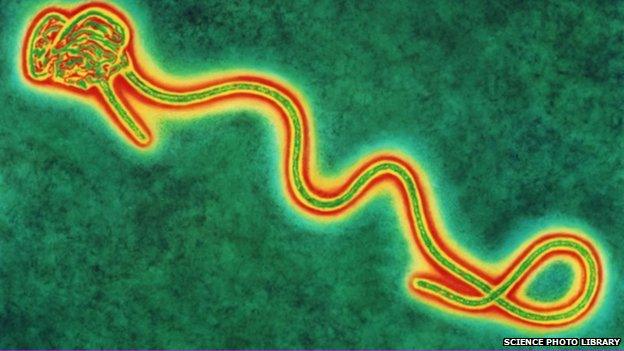
Symptoms include high fever, bleeding and central nervous system damage
Fatality rate can reach 90%
Incubation period is two to 21 days
There is no vaccine or cure
Supportive care such as rehydrating patients who have diarrhoea and vomiting can help recovery
Fruit bats are considered to be virus' natural host
Are you affected by the issues raised in this story? Are you in West Africa or do you have family there? You can send your experiences to haveyoursay@bbc.co.uk, external using 'ebola' in the subject.
- Published13 November 2014
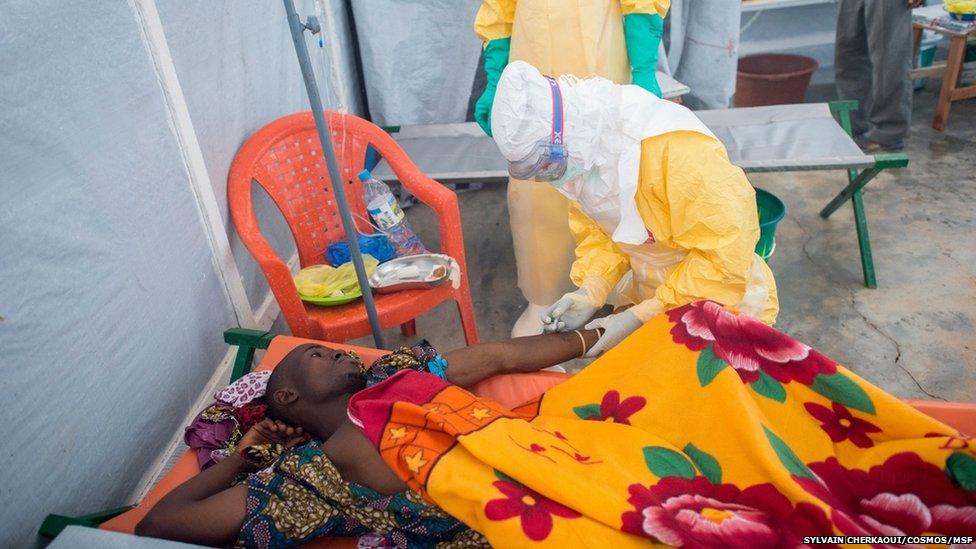
- Published29 July 2014
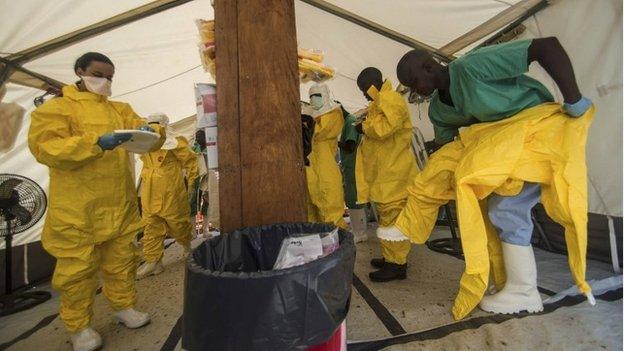
- Published30 July 2014
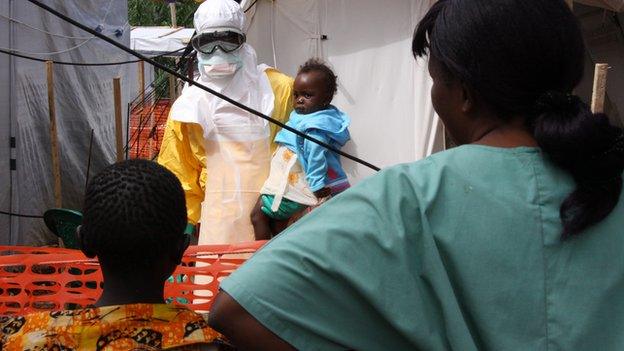
- Published8 October 2014
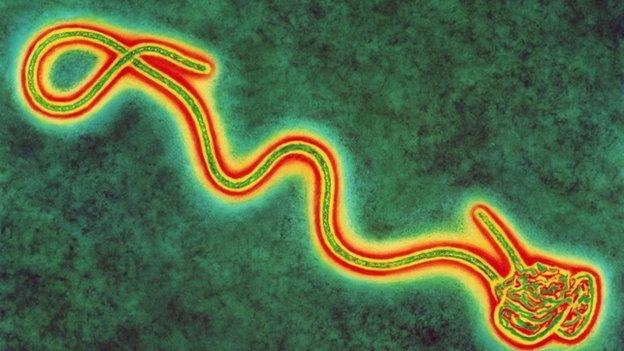
- Published24 April 2014
